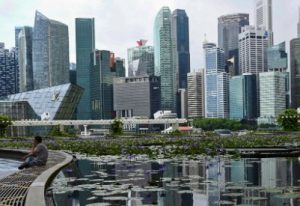Singapore votes as ruling PAP seeks fresh mandate amid escalating US-China trade tensions

Singapore: Singaporeans headed to the polls Saturday in a closely watched general election, as the ruling People’s Action Party (PAP) seeks a renewed mandate against the backdrop of mounting global economic uncertainty driven by US tariffs on China — the city-state’s largest trading partner.
By noon, around 48 per cent of over 2.63 million registered voters had cast their ballots.
Voting began at 8 am local time at 1,240 stations set up island-wide, with polling booths set to be closed at 8 pm and results expected late at night.
In a 12:00 pm update, the Elections Department (ELD) said 1,261,449 Singaporeans had turned up to cast votes at the 1,240 polling stations island-wide. There are 2,758,846 registered voters in the country.
A total of 18,389 people have successfully registered as overseas voters.
As many as 206 candidates from 11 parties, including two independents, are vying for 92 seats across 32 constituencies.
Cost of living, housing, and the rising number of foreign workers are the key election issues.
Some voters braved heavy rains early morning to cast their votes, with a few queuing up more than an hour before polling stations opened at 8 am.
More than 18,000 Singaporeans overseas have also begun voting at Singapore missions in Dubai, London, Washington, New York and San Francisco, which opened their polling stations at 8 am local time on May 2, according to The Straits Times.
Prime Minister Lawrence Wong, completing nearly a year in office, is seeking a fresh mandate for PAP, which has governed the city-state since Independence and steered its development into a global financial hub.
This is Singapore’s 19th election since the first general election in 1948 and 14th since its Independence in 1965.
“Singapore is in the cross road between US and China trade war,” a diplomatic source said, adding that the trade focused island has strong diplomatic and economic relations with both the giant economies, a fall off from which will affect its future progress.
Multinational corporations and Asian businesses, using Singapore as a springboard into Asian markets, are closely monitoring the 2025 election, the source said.
Singapore’s total population stood at approximately 6.04 million as of June 2024, a two per cent increase from the previous year, mainly driven by the growth in the non-resident population, according to the Population-in-Brief report.
On April 23, nomination day, PAP won five seats uncontested in the Marine Parade-Braddell Heights Group Representation Constituency (GRC). Under Singapore’s electoral system, GRCs are similar to party block voting systems in some other countries.
Eleven political parties and two independents are contesting in 32 constituencies. The PAP is fielding candidates in all 92 constituencies, while its main rival, Workers’ Party (WP), is contesting 26 seats in eight constituencies. The Progress Singapore Party (PSP) has fielded 13 candidates across six constituencies.
Other parties in the fray include the Singapore People’s Party (SPP), Singapore Democratic Party (SDP), People’s Power Party (PPP), People’s Alliance for Reform (PAR), Red Dot United (RDU), National Solidarity Party (NSP), Singapore United Party (SUP), and Singapore Democratic Alliance (SDA).
PTI
News